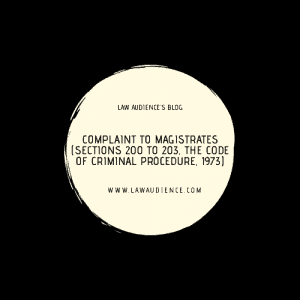AUTHORED BY: MR. PRANAV TOMAR, B.A.LL.B, 1ST YEAR STUDENT AT RAJIV GANDHI NATIONAL UNIVERSITY OF LAW & RESEARCH WRITER AT LAW AUDIENCE
I. INTRODUCTION:
A prospectus can be defined as a formal legal document which provides offers from the public for investment. Prospectus means any document described or issued as a prospectus or any notice, circular, advertisement or other document inviting offers from the public for the subscription or purchase of any securities of a body corporate.[1]
The foremost objective in issuing the prospectus is to escalate public interest in the company and to persuade the general public to buy corporates shares or debentures. It can be considered as a ‘market show’ in order to attract investors so that they can invest money in the securities of the body corporate. The prospectus is a necessary aid as it is the only source from which the investors can observe the soundness of the company’s venture. This, in turn, temp the directors of the company to portray a rosy image of the company by depicting all the good points and concealing its weak points or limitations. In order to protect the interests of the investors, the Companies Act, 1956 enforces a large number of regulations for the company to maintain while issuing prospectus.
II. DIFFERENT CATEGORIES OF PROSPECTUS:
The statement in lieu of prospectus:
A public company which refrain itself from raising its capital by public issue is not required to issue a prospectus. In such a situation a statement in lieu of prospectus must be filed with the Registrar three days prior to the allotment of shares or debentures is made. It must be dated and signed by the directors of the company and should contain the particulars of an ideal prospectus.
Deemed Prospectus:
According to the law, all the legal documents containing an offer of investment in the form of shares and debentures shall be self-contained according to the definition of the prospectus given under section 2 and shall be deemed as a prospectus by implication of law.[2] Unless the contrary is proved, an allotment or an agreement to allot shares or debentures shall be deemed to have been made with a view to the shares or debentures being offered for sale to the public if it is shown:
- That the offer of the shares or debentures of or any of them for sale to the public was made within 6 months after the allotment or agreement to allot; or
- That at the date when the offer was made the whole consideration to be received by the company in respect of the shares or debentures had not been received by it.[3]
Abridged prospectus:
It refers to the memorandum containing salient features of the prospectus as specified by the SEBI. No kind of application for the purchase of any securities of a body corporate should be issued unless such form is accompanied by an abridged prospectus. Prior furnishing the subscription, a copy of the prospectus shall be made to the person of all the lists and the offers.[4]
A company is allowed to change the referred terms of the contract in the prospectus or object for which the prospectus was issued, but it is subjected to approval or authority by special resolution. The notice of such a resolution must be published in the local newspaper in the city where the company is a registered office. These notices shall clearly indicate the justification for such variation.[5]
There may be a situation where the shareholders do not agree with the proposals of the contracts or objects referred to in the prospectus. In order to safeguard these shareholders, they are given exit offers by the promoters or controllers of the shares at exit prices as determined by the regulations established by the Securities and Exchange Board of India.
The Companies Act has defined certain legal requirement about the registration of a prospectus. The prospectus would be held illegal if it didn’t meet these guidelines.[6]
If the corporate body didn’t abide by the regulations then it will be punishable with fine, not less than 50,000/- and may stretch to Rs. 3, 00,000/-. It also attracts imprisonment of up to three years.
Criminal Liability for Mis-Statement in Prospectus:
In order to claim criminal liability for misstatements in the prospectus, one of the following two conditions has to be met:
- The prospectus issued, circulated must include any statement which is untrue in nature or creates a misleading context; or
- The prospectus issued has any inclusion or omission of any matter that is likely to mislead the population.[7]
Any individual found authorizing the issue of such kind of prospectus shall be held liable fraud under section 447 of Companies Act 2013. One can be absolved from the liability by claiming the following:
- It will be a compulsion to prove that statement or omission was immaterial;
- There was a reasonable ground to believe that the statement or object mentioned was true in essence; or
- There was a reasonable ground to believe that inclusion or omission was necessary.
Civil Liability for Mis-Statement in Prospectus:
Where an individual has opted for securities from a particular company acting upon any misleading statement, inclusion or omission and has sustained any amount of loss or damage as its consequence. The director at the time of issue of the prospectus, the promoter and different persons involved in the issuing of the prospectus shall be held liable to pay compensation to the affected person. [8] This civil liability shall be in addition to the criminal liability established under section 36 where damages will be awarded to the affected person for any of the losses or damages that may have been incurred by any person who opted for the securities of the company. The company can be absolved from liability by opting from the following defences:
- It has to be proved that the director or any other person accused has withdrawn his consent or never gave his consent
- It has to be established that the prospectus thus published was not published under his knowledge or consent and when he came to know about the same, he/she issued public notice claiming it to be without his permission or knowledge.
III. CONCLUSION:
As stated above clearly, a prospectus is a compulsory legal document which allows the companies to initiate their business in the country. According to the guidelines stated by the SEBI, there have been safeguards enforced to ensure a safe transaction of shares and debentures between the buyer and the company. But due to long procedures and laws to abide by, the process falls victim to delays in the operation of the business. The corporate bodies many times hesitate to issue prospectus to the general population from buying and selling and buying of the capitals.
[1] Section 2(70), Companies Act, 2013.
[2] Section 25, Companies Act, 2013.
[3] Ibid.
[4] Section 2 (1), Companies Act, 2013.
[5] Section 27.
[6] Section 26.
[7] Section 34, Companies Act, 2013.
[8] Section 35, Companies Act, 2013.



